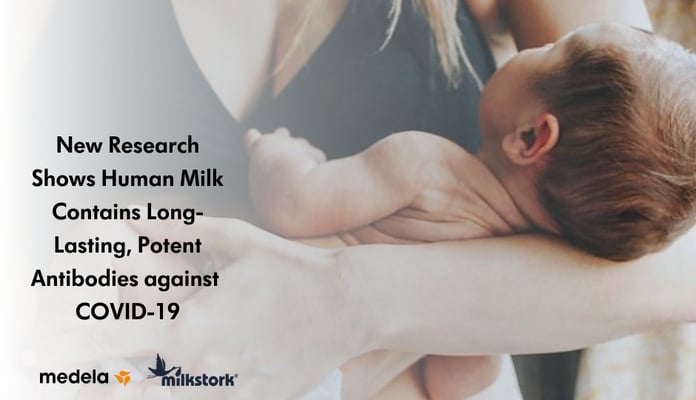New Research Shows Human Milk Contains Long-Lasting, Potent Antibodies against COVID-19
By Kate Torgersen on March 23, 2021

NEW YORK — March 23, 2021 — A new study shows that milk from lactating mothers who were previously infected with COVID-19 contains long-lasting COVID-19 antibodies capable of blocking virus infection, which was published on MedRxiv. The research, led by Rebecca Powell, PhD, Assistant Professor of Infectious Diseases at the Icahn School of Medicine at Mount Sinai, is a continuation of preliminary work earlier in the pandemic that demonstrated that after infection, nearly all women produce a particularly potent type of antibody against COVID-19, known as secretory (s) IgA, which can last a relatively long time in the infant mouth or gut. This new study builds on this original finding and is the first to show that not only are these sIgA present in the milk after infection, they last at least 7–10 months in nearly all cases and can neutralize the virus. Dr. Powell aims to determine if extracted antibodies of this type could be used as a COVID-19 therapeutic — an exciting but highly understudied area of human milk research.
“The findings from our research are incredibly relevant as we actively work to stop the spread of this unprecedented virus,” said Dr. Rebecca Powell, study coauthor.
The recent study was conducted using milk samples transported to Dr. Powell’s team at Mount Sinai with support from Medela and Milk Stork, who partnered to provide human breast milk shipping services for the study. The team at Mount Sinai compared milk samples prior to and during the pandemic to assess them for various classes of antibodies and antibody function. Findings revealed that 95% of pandemic samples from COVID-19-recovered donors had SARS-CoV-2-specific sIgA activity, and 75% of samples were also positive for specific IgG. All milk samples from COVID-19-recovered donors with significant levels of sIgA also exhibited robust SARS-CoV-2 neutralization capacity. Importantly, in all milk samples, the specific sIgA persisted as long as 7–10 months after infection.
Medela and Milk Stork provided logistical and financial support for this research.
About Medela:
Through advancing research, observing natural behavior and listening to our customers, Medela turns science into care while nurturing health for generations. Medela supports millions of moms, babies, patients and healthcare professionals in more than 100 countries all over the world. As the healthcare choice for more than 6 million hospitals and homes across the globe, Medela, the #1 breast pump brand*+, provides the leading research-based breast milk feeding and baby products, healthcare solutions for hospitals, and clinical education. Medela is dedicated to building better health outcomes, simplifying and improving life, and developing breakthroughs that help moms, babies and patients live their life to the fullest. For more information, visit www.medela.com.
About Milk Stork:
Milk Stork was launched in August 2015 as the first-ever breast milk shipping company for moms who needed a simple solution for getting their breast milk to their babies back home. Working mom made and made for working moms, Milk Stork supports more than 749 employers that provide its service to their employees as a benefit, including Salesforce, SAP, AstraZeneca, Nissan, and Home Depot. In February 2019, Milk Stork was awarded Fast Company’s Most Innovative Companies Award in the Travel category for its unparalleled commitment to supporting working, traveling moms. In October 2020, Milk Stork announced its Flock, a robust family benefits platform designed to give employers a one-stop-shop for family-friendly benefits. For more information on Milk Stork, visit www.milkstork.com and follow us on Facebook, Instagram, and Twitter.
*Voted most trusted breast pump brand by United States and Canadian shoppers based on the 2020 BrandSpark® American and Canadian Trust Studies
+IQVIA ProVoice Survey; September 2019 — August 2020.


